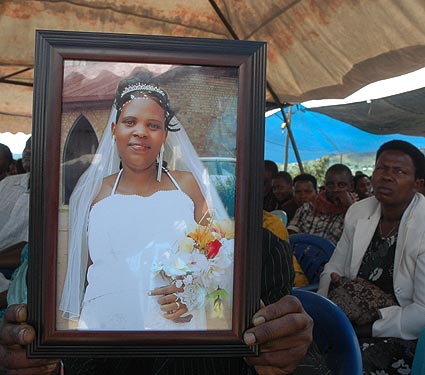A tragic incident unfolded last week in Mubende when a young born-again bride collapsed and died on what was supposed to be the happiest day of her life. The joyous wedding celebration quickly turned into a scene of shock and grief as family, friends, and guests looked on in disbelief.
The bride, described by friends as vibrant, cheerful, and full of life, was moments away from exchanging vows with her groom when the incident occurred. Witnesses reported that she seemed healthy and excited throughout the morning, making the sudden turn of events even more heartbreaking.
The tragedy struck during a prayer led by the pastor at the altar. Suddenly, the bride felt unwell and lost consciousness. Initially, guests assumed she might have been overcome by nerves or excitement, but it soon became clear that the situation was far more serious.
As the bride remained unconscious, panic swept through the church. Family and friends rushed to her side, desperately hoping she would regain consciousness. The groom reportedly stood frozen in shock, unable to comprehend the heartbreaking scene unfolding before him.
The pastor immediately intensified prayers, calling on divine intervention, while the congregation joined in with fervent supplications for her recovery. Despite the outpouring of prayer and support, the bride did not awaken.
Medical personnel were called to the scene without delay. Doctors and paramedics arrived and administered urgent care, but tragically, she was pronounced dead about an hour later. Authorities have not yet disclosed the cause of her sudden death.
The community of Mubende has been left in profound mourning. Relatives, friends, and church members are struggling to come to terms with how a day meant for celebration could end in such sorrow. Many have expressed their grief and shock both online and within the church.
This heartbreaking event has also sparked discussions about the importance of health precautions and awareness during major gatherings like weddings. Some close friends revealed that the bride had seemed perfectly fine, leaving many to wonder if an underlying health issue may have contributed to her untimely death.
The groom, devastated by the sudden loss, has been consoled by family members and church leaders. The wedding, once eagerly anticipated, will now be remembered for its tragic ending rather than the joy it was meant to celebrate.
As the community grieves, plans are underway for the bride’s burial and memorial services. Her sudden passing serves as a stark reminder of life’s fragility and how quickly moments of joy can turn into profound sorrow.
